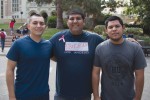A last-minute deployment to Iraq and a three-month extension in Hawaii shook up Angel Fulgencio’s plans for college.
He was unable to leave active duty until February 2008. Eager to get back to school, Fulgencio completed the community college credits needed to transfer by the end of 2010. But he had to wait several months until he was admitted to UCLA – his dream school – because the University of California only accepts new applicants once a year. The policy often leaves veterans like Fulgencio waiting for months for their chance to start classes.
While he waitednine months to start classes at UCLA after finishing community college Fulgencio stayed at Ventura College for spring semester, taking classes, while working as a security guardpart-time.
“I couldn’t stay … at home and doing nothing, and my family wasn’t financially stable,” he said. At 28 years old, he is finally finishing his last year at UCLA.
Earlier this month, UC President Janet Napolitano visited UCLA’s campus to listen to student concerns during a special luncheon. Thomas La Marr, the sole student veteran present at the meeting, brought up the admissions policy as one of the main issues veterans face at UCLA.
“There’s a very small number of veterans here at UCLA, partly because of the admissions policy, and the school can do more to be more veteran-friendly,” the fourth-year psychology student said in an interview.
The UC accepts applications only once a year because it receives so many applications, said UC spokeswoman Dianne Klein. Accepting applications at several times throughout the year would make it difficult for officials to process them all, she said.
Late applications to the UC can be considered if applicants write to the respective admissions office explaining the reason for missing the application deadline or why they cannot wait until the next admission period, Klein said.
These exceptions are only granted on a case-by-case basis, Klein said. For instance, the UC could make an exception for an applicant who was injured in a car crash on the day applications were due.
“There’s no blanket rule, and it really depends on the student’s situation,” Klein said.
Making exceptions for a specific group of applicants, such as veterans, would make it difficult to draw the line for other groups of students, Klein added.
La Marr, who works at the UCLA Veterans Resource Center, also waited several months after returning from military service in 2008 before being admitted to UCLA.
“Because I’m married, I have a family to support, and it was difficult to find a temporary job,” he said.
There are about 300 student veterans at UCLA, said university spokesman Ricardo Vazquez.
Currently, 85 percent of student veterans are age 24 or older, and 47 percent of them have families, according to Student Veterans of America, a non-profit organization supporting the welfare of student veterans across the country.
The situation is more difficult because military service members often don’t know their exit times until the last minute, La Marr said.
Soldiers, especially those on deployment, often find their duty extended, and negotiation with a supervisor is out of the question, said Miguel Liera, a UCLA student veteran who graduated this spring.
For Fulgencio, he had no choice but to accept the extensions.
“Things really changed and I just had to adapt to it,” he said.
Fulgencio, like many other student veterans, was not aware of the option for applicants to petition for special admission to the UC.
La Marr said he believes more can be done to help student veterans.
For Fulgencio, however, time is already lost.
“I was young when I went to the army, and now I’m the oldest in my classes,” he said. “I could’ve graduated already.”
